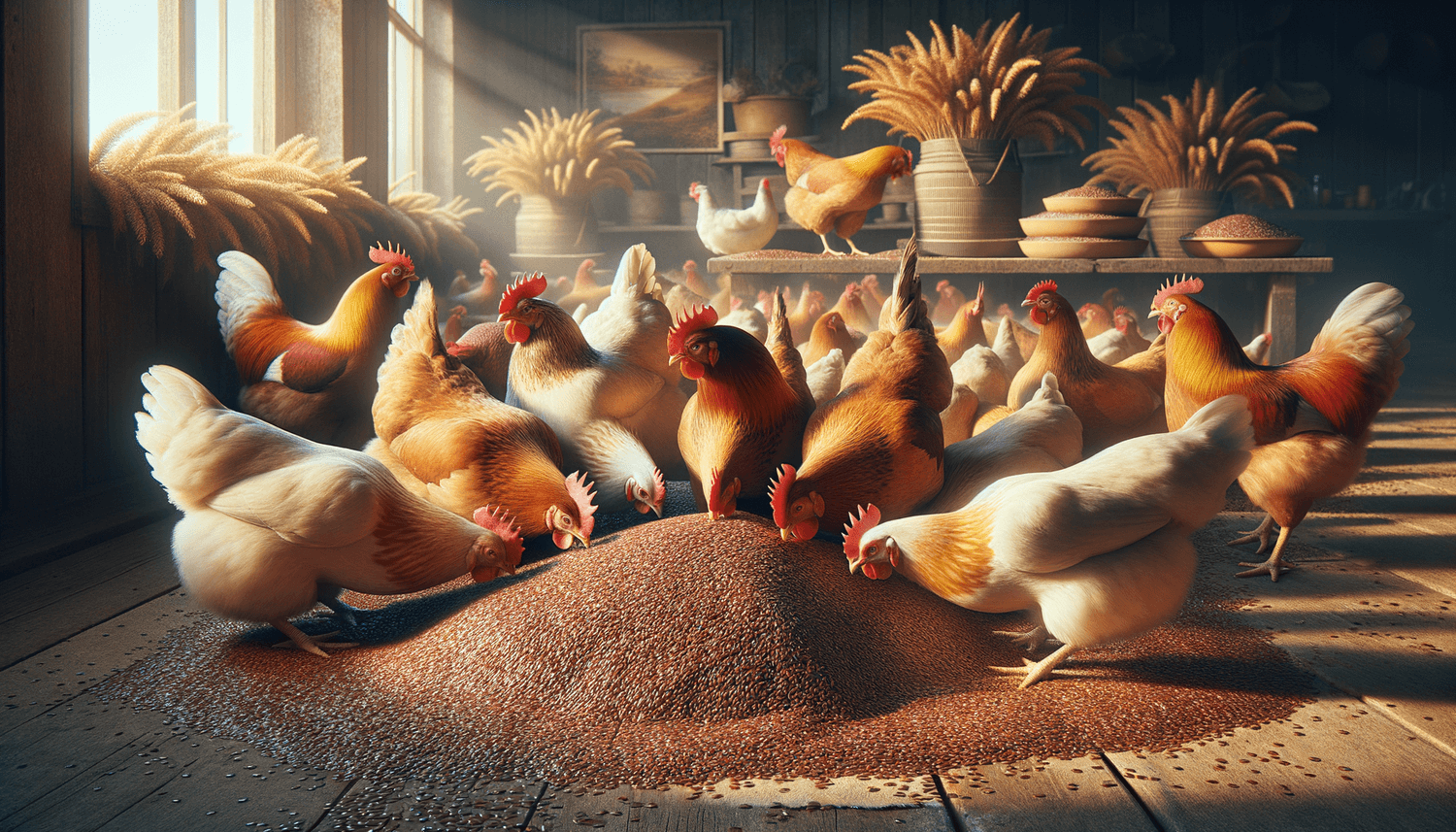Welcome to another cluckin’ good discussion on our favorite feathery friends! Today, we’re delving into the world of flaxseed, and whether our beloved backyard chickens can reap the benefits. From understanding the importance of a balanced diet to exploring the nutritious nature of flaxseed, we’ll be taking a hatchet to the myths and feathering our knowledge with some intriguing insights. And, of course, we’ll guide you through the best ways to prepare this superfood for your hens to ensure they get the most out of this versatile seed. So, let’s get cracking and find out if chickens can eat flaxseed!
Can chickens eat flaxseed?
Yes, chickens can safely eat flaxseed! Flaxseed is not only safe for your backyard chickens but also provides numerous nutritional benefits. It’s a wonderful addition to their diet, offering quality protein, essential fatty acids, and various other nutrients that contribute to the overall health and well-being of your flock.
A balanced diet for backyard chickens
Just like humans, chickens need a balanced diet to maintain their health and happiness. A well-rounded diet not only keeps them in good physical shape but also helps ensure strong egg production and a healthy immune system. The primary component of a chicken’s meal plan should be a high-quality chicken feed, specifically designed to meet their nutritional needs.
Typically, chicken feed should make up around 80-90% of their diet. This ensures that your feathered friends get the right mix of protein, vitamins, minerals, and other essential nutrients. It’s important to focus on high-quality feed, as it directly impacts the overall health and well-being of your flock.
As for the remaining 10-20% of their diet, this can consist of treats like fruits and vegetables. These tasty tidbits not only provide extra nutrition but also contribute to the overall enjoyment your chickens will experience during mealtime! By ensuring a balanced diet, you keep your chickens happy, well-fed, and ready for whatever adventures await them in your backyard.
Nutritional value of flaxseed for chickens.
Flaxseed is a rich source of nutrients that can provide numerous health benefits for chickens. One of the key components of flaxseed is its high omega-3 fatty acid content, particularly alpha-linolenic acid (ALA), which is crucial for maintaining optimal heart and brain health in your flock. Omega-3 fatty acids are also known for their anti-inflammatory properties, contributing to an improved immune system in your chickens.
Apart from healthy fats, flaxseed also offers high-quality protein, which is essential for muscle development and growth, as well as for strong egg production. Alongside protein, flaxseed contains a notable amount of soluble and insoluble dietary fiber, which can help support proper digestion in chickens.
In addition to these core nutrients, flaxseed serves as a source of various vitamins, including Vitamin B1, Vitamin B6, and Vitamin E, as well as minerals like magnesium, phosphorus, and manganese. These vitamins and minerals play a crucial role in maintaining optimal metabolic function, bone health, and oxidative stress management in your feathered friends.
Overall, flaxseed is a nutritionally dense and beneficial ingredient that can be safely introduced into your chickens’ diet, providing them with essential nutrients to support their health and well-being.
Nutrition table of flaxseed for chickens.
| Information | Description |
|---|---|
| Nutritional Value | Rich in omega-3 fatty acids, high-quality protein, dietary fiber, vitamins, and minerals. |
| Suggested Serving Size | About 1-2 tablespoons per chicken per day, mixed with their regular feed. |
| Safe Feeding Practices | Start with smaller amounts and gradually increase the serving size while observing the flock’s well-being. |
| Preparation | Preferably with ground flaxseed, as whole flaxseeds may not be fully digested by chickens. |
| Potential Risks | Feeding excessive amounts can cause digestive issues, imbalanced nutrient intake, and potentially alter egg production. |
| Hydration | Ensure chickens have access to clean water, as flaxseeds can absorb water in the digestive system. |
| Digestion | Flaxseed’s fiber content can support proper digestion in chickens. |
| Seasonal Availability | Flaxseed is not dependent on seasonality and is typically available year-round. |
| Other Benefits | Improved heart and brain health, stronger immune system, and support for optimal metabolic function and bone health. |
Introducing flaxseed to your chicken’s diet
While flaxseed offers several health benefits for your backyard chickens, it’s essential to introduce it gradually into their diet. Start by giving a small portion to your flock to monitor their reaction, and then increase the amount up to the suggested serving size. Remember, moderation is key – too much flaxseed could result in an imbalanced diet and digestive issues.
Storing flaxseed
Proper storage of flaxseed is important to maintain its nutritional value and prevent spoilage. Keep your flaxseed in an airtight container and store it in a cool, dark, and dry place. If you choose to ground the seeds, to help chickens fully digest them, remember that the ground flaxseed has a shorter shelf-life due to its increased exposure to air. It’s best to use it within a few weeks or store it in the refrigerator for up to a few months.
Additional treat ideas for your chickens
Supplementing your chicken’s diet with other healthy treats can be a fun and nutritious way to diversify their meals. Some other great options include leafy greens, vegetables such as carrots and cucumbers, and fruits like berries or watermelon. Keep in mind that these treats should only make up a small percentage of their overall diet, with the majority of their nutrition coming from high-quality chicken feed.

















